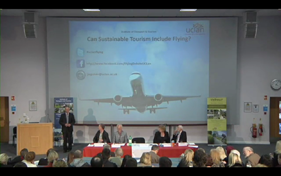Can Sustainable Tourism include Flying

Surprising degree of agreement when four distinguished experts met to debate if flying can be part of sustainable tourism. Writes Jo Guiver
Chairing the debate Debate, at the University of Central Lancashire on March 30th 2012 was Richard Sharpley, Professor of Tourism & Development at the University who himself has written about the ‘Myth of Sustainable Tourism’.
On the side saying that sustainable tourism can include flying were Valere Tjolle, sustainable tourism editor for TravelMole and Dr Davina Stanford, writer, researcher and lecturer in responsible tourism at the International Centre for Research in Events, Tourism and Hospitality, Leeds Met University.
Opposing them were Paul Peeters, a former aeronautic engineer and now Associate Professor of Sustainable Tourism and Transport at NHTV Breda University of Applied Sciences and Professor Les Lumsdon, Emeritus Professor of Tourism at University of Central Lancashire and writer on slow travel and sustainable tourism.
All the speakers acknowledged that tourism contributed to climate change emissions and that on average travel accounted for 75% of tourism’s emissions, a large part of which was from aviation.
There was also agreement, that without intervention, this was set to increase as growing affluence in countries such as China allowed more people to travel further. Both Valere Tjolle and Les Lumsdon argued that increases in CO2 emissions would be catastrophic. Paul Peeters stressed the importance of aviation for tourism’s impact on climate change. Although the proportion of trips by plane was relatively low, they were for much longer distances than other modes and through radiative forcing caused by emissions at altitude had a disproportionate impact on climate change. He argued that tourism would have to share the burden of reducing emissions and the predicted growth in flying was totally incompatible with sustainable development. The only way that tourism could achieve the required 70% reduction in emissions by 2050 was to cease all but the most essential flights or keep current levels of tourist flying and convert all tourism journeys currently made by car to train.
There were differences in opinion about the possible role of technology. Davina Stanford was optimistic that improvements in fuel efficiency and alternative fuels would reduce the environmental impact of flying. Paul Peeters contended that there was limited potential for improving performance and that even research targets are above the needed reduction in emissions. Les Lumsdon felt that improvements in efficiency and the use of alternative fuels were more likely for surface travel than aviation. Davina Stanford highlighted the problems with improving ground travel, particularly high speed train and the impact of building new lines.
The speakers in favour of including flying in sustainable tourism emphasised the importance of tourism to less developed countries. Valere Tjolle defined sustainable tourism as ‘just equitable trade with economic benefits for the destination’ and maintained that tourism had enormous potential to help bring people, especially women, out of poverty. Richard Sharpley referred to tourism as one of the largest voluntary transfers of wealth from the rich to the poor. Davina Stanford used the example of SIDS (small island developing states) to demonstrate how, in some cases, tourism was one of the few ways of bringing development. All the speakers agreed that large companies can prevent the destinations reaping the full benefits of incoming tourism and this required effective management. A relatively small proportion of tourism involves flying or international travel and Paul Peeters had calculated the impact of a 3,000 km limit to flying on destination countries. This showed that many countries, both developed and developing, would benefit from increased domestic and more local tourists. Les Lumsdon warned the audience not to think of tourism as just a social phenomenon, but as an industrial-scale business which batches people onto cruise liners, aircraft, beaches, hotels and café quarters, uses a lot of energy and tries to reduce the costs in its supply chains. Although tourism can bring benefits to destination populations, these are often outweighed by the disbenefits and be accompanied by a growing differences in the incomes of rich and poor.
Although there was general agreement that tourists benefit from travel, there were different emphases.
Valere Tjolle felt that tourism offered a chance to experience different countries, unmediated by other people and was important for personal development, often involving a spiritual element and encouraged environmental stewardship and world peace. Davina Stanford talked about the importance of aviation for dispersed communities to maintain ties with family and friends. Les Lumsdon disputed that long distance travel to exotic places was necessary and suggested slow travel and closer destinations could fulfil most tourism needs as it had in the recent past.
There were rays of optimism and pessimism about the possibility of behavioural change. Evidence of a growing interest in off-setting and carbon trading were quoted by Davina Stanford and previous changes in attitudes and behaviour to issues such as smoking, child abuse and homo-sexuality by Les Lumsdon as reasons to believe change was possible. Valere Tjolle pointed to the growth in low cost air carriers as a worry for the long-term sustainability of tourism.
The main differences between the arguments of those agreeing and disagreeing about whether sustainable tourism can include flying appear to be about the urgency and severity of the need to reduce total CO2 emissions. Those arguing that flying can help sustainable development focus on the benefits to destinations in the developing world, while those arguing against flying see climate change as the global priority requiring massive reductions in emissions from every activity even those which might benefit developing countries.
Jo Guiver
Keep up with the latest sustainable tourism info, special offers HERE
 United Kingdom
United Kingdom United States
United States Asia Pacific
Asia Pacific












































Dozens fall ill in P&O Cruises ship outbreak
Turkish Airlines flight in emergency landing after pilot dies
Boy falls to death on cruise ship
Unexpected wave rocks cruise ship
Woman dies after going overboard in English Channel